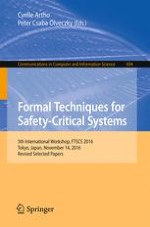2017 | OriginalPaper | Buchkapitel
Automating Time Series Safety Analysis for Automotive Control Systems in STPA Using Weighted Partial Max-SMT
verfasst von : Shuichi Sato, Shogo Hattori, Hiroyuki Seki, Yutaka Inamori, Shoji Yuen
Erschienen in: Formal Techniques for Safety-Critical Systems
Aktivieren Sie unsere intelligente Suche, um passende Fachinhalte oder Patente zu finden.
Wählen Sie Textabschnitte aus um mit Künstlicher Intelligenz passenden Patente zu finden. powered by
Markieren Sie Textabschnitte, um KI-gestützt weitere passende Inhalte zu finden. powered by
